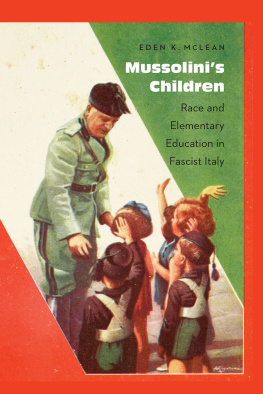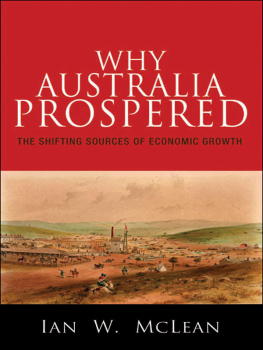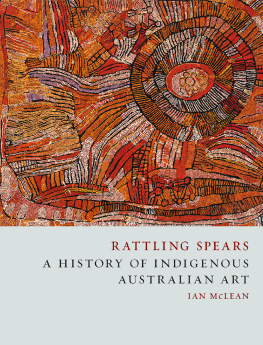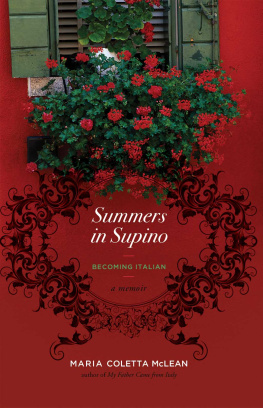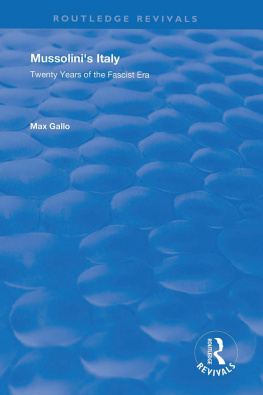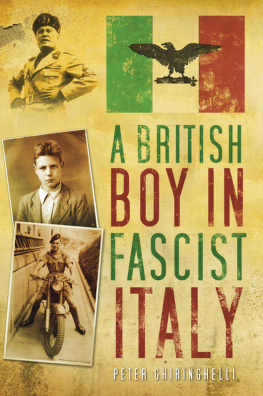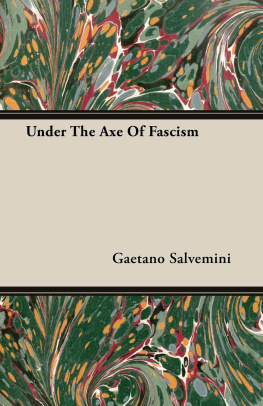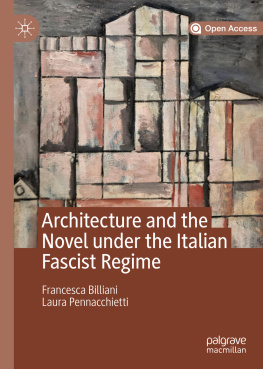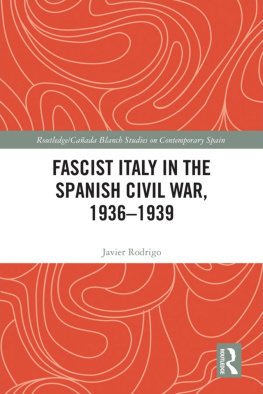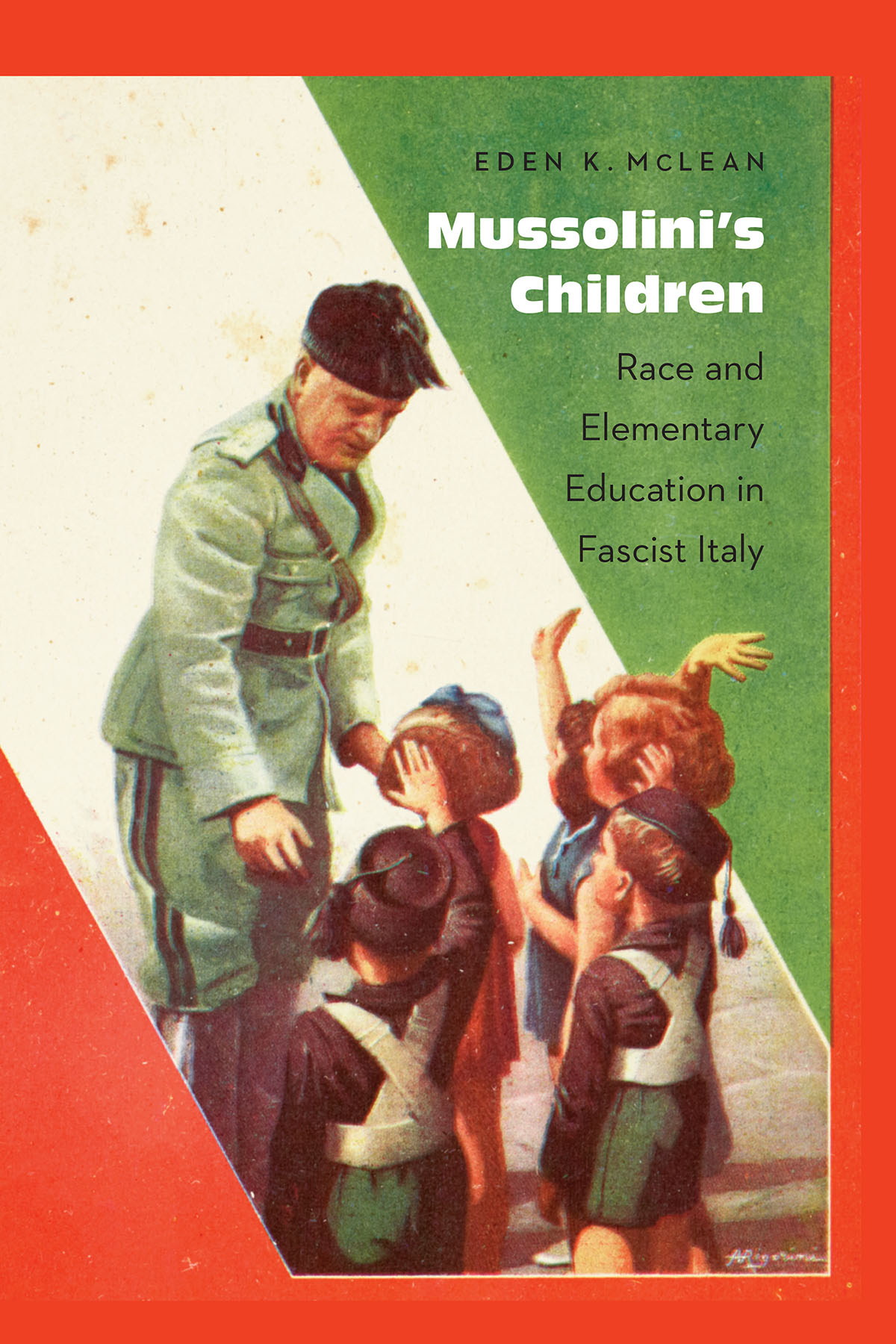Michael R. Ebner, associate professor of history at the Maxwell School of Citizenship and Public Affairs, Syracuse University
A vivid illustration of how hegemony works in transmitting the ideas of high culture to society at large. The great strength of the book lies in Eden McLeans indefatigable research on the Fascist educational organizations, published materials, and the pedagogues who translated the regimes racial theories into classroom practice.
Richard Drake, Lucile Speer Research Chair in Politics and History at the University of Montana
Eden McLean draws on new sources and deft historiographical context to create a rich, convincing argument about racism and nationalism under Fascism.
Mark I. Choate, associate professor of history at Brigham Young University
Mussolinis Children
Race and Elementary Education in Fascist Italy
Eden K. McLean
University of Nebraska Press | Lincoln & London
2018 by the Board of Regents of the University of Nebraska
Portions of the introduction and chapters 1 and 2 have previously appeared in The Rhetoric of Race in Fascist Elementary Education, in New Perspectives in Italian Cultural Studies, vol. 2, The Arts and History, ed. Graziella Parati (Madison and Teaneck NJ : Fairleigh Dickinson University Press, 2013), 26584. Used with permission.
Cover designed by University of Nebraska Press; cover image is from the interior.
Author photo Photographic Services.
All rights reserved.
Library of Congress Cataloging-in-Publication Data
Names: McLean, Eden K., author.
Title: Mussolinis children: race and elementary education in Fascist Italy / Eden K. McLean.
Description: Lincoln: University of Nebraska Press, 2018. | Includes bibliographical references and index.
Identifiers: LCCN 2017043090
ISBN 9781496206428 (cloth: alk. paper)
ISBN 9781496207203 (epub)
ISBN 9781496207210 (mobi)
ISBN 9781496207227 (pdf)
Subjects: LCSH : Fascism and educationItaly. | FascismItalyHistory20th century. | Fascism and youthItalyHistory20th century. | ItalyRace relations.
Classification: LCC LA 791.8 . M 35 2018 | DDC 372.94509/041dc23
LC record available at https://lccn.loc.gov/2017043090
The publisher does not have any control over and does not assume any responsibility for author or third-party websites or their content.
For Malcolm
Contents
I only realized the complexity of my research ambition during a dinner with an Italian politician of impeccable anti-Fascist pedigree. I had recently arrived in Rome for a year of dissertation research and hoped my idealism and curiosity made up for a distinct lack of archival experience. When the gentleman in his three-piece suit asked me for the focus of my research, I simply and guilelessly stated, Fascist racism. He pondered this information for a moment and then responded, Well, that is interesting, because the Fascists were not racist. I made some early attempts to explain my approach, but it was soon clear that we had very different views of race and racism. My host explained, Italians cannot be racist, because there is not just one race in Italy. When I then suggested that his assertion indicated a belief in the existence of races, he looked at me blankly. Come no? Of course races exist. I tried to articulate the problem behind any biological notion of race, and he soon conceded, Okay, maybe there are no biologically pure races, but certainly there are races based on history, culture, and language. And with that explanation, I saw both the challenge and the necessity of a project on Italian ideas of race during the Fascist years.
I dreamed of writing a book based on sources no one had ever seen, on documents that automatically changed the way I and everyone else understood the power and limitations of Italian Fascism. Instead, I wrote a book that relies on evidence accessible to and read by millions of people and that tackles what most readers will agree is a contentious topic. The distance between there and here has been long and hardly linear. What did not change over the course of that decade-long journey were my entwined convictions that we must not ignore the power of ideas and that racism played a fundamental role in Italian Fascism. Along the way, I have relied on innumerable people to help me navigate the difficulties of exploring a delicate subject from a new perspective and develop the skills, questions, and friendships necessary to enjoy the adventure. I know I cannot take full credit for whatever strengths this book might have. All its faults, however, are entirely my own.
As with any project that starts in the mind of a nave graduate student and eventually turns into a book, I could not have completed Mussolinis Children without the patient and persistent work of many graduate mentors and colleagues. I must first thank Frank Snowden for the guidance and friendship he has shown me since I arrived in Yales Department of History over a decade ago. During my time in New Haven, he often anticipated my needs before I knew they existed: he pushed me to explore ideas or avenues when I felt I went far enough; he suggested sources, contacts, or opportunities before I had a chance to ask for them; he expressed concerns when I focused too narrowly or too broadly on a subject; and he always had advice for how to improve. Even still, half a continent (or farther) away and with a very full schedule, Frank is never too busy to read a draft or lend an ear. I owe so much of my growth as a scholar and a teacher to Frank and hope he knows how dear he is to me.
I also owe many thanks to my other generous graduate-school mentors. Both Tim Snyder and Mark Choate read numerous drafts from out of state and country, and I very much appreciate their continued support. John Merriman and Adam Tooze also read various chapters and gave invaluable suggestions for further reading and clarification. Penny Marcus, too, offered her endless enthusiasm for the project, and Ute Frevert generously shared friendship, knowledge, and martinis with her neighbor. I also had the distinct pleasure of sharing my work with two writing groups in New Haven. Julia Irwin, Grace Leslie-Waksman, and Alison Greene, as well as Sarah Cameron, Lisa Pinley Covert, and Yedida Kanfer, offered their detailed readings and broad knowledge to expand and clarify my writing and thinking. Of course, there were many other graduate-school friends who offered food, dog care, and other forms of support while we worked to figure out the strange world of academia. Kirsten Weld, Steve Prince, Jason Ward, Marco Duranti, Sam and Dana Schaffer, Megan and Sylvan Long, and the Sacks-Huether familyI am forever grateful to and for you all.
The end of graduate school can sometimes leave a young scholar feeling a little unmoored, but I have been fortunate enough to find warm and supportive communities within my departments at Western Connecticut State University and Auburn University, and at a variety of conferences and archives. Since arriving at Auburn in 2012, I have felt the encouragement and confidence of all my colleagues and am constantly impressed by how thoughtful and smart they are. Ralph Kingston read early (atrocious) new chapter drafts and provided me with profoundly helpful feedback. Christopher Ferguson, too, has read a variety of rough-hewn pieces and, just as importantly, has served as an intellectual coach and cheerleader. The members of the cul-de-sacSarah Hamilton, Kate Craig, Alan Meyer, Kelly Kennington, and Melissa Blairhave sustained me with their humor, kindness, and deep supply of word suggestions. Ken Noe and Donna Bohanan, despite their busy schedules, have consistently been sources of wisdom and support for me. And then theres David Carter, who has been an irreplaceable mentor, editor, ally, therapist, babysitter, and colleague to me. I was so grateful to find family here in Auburn. I have also benefited from the generosity and intellects of Joshua Arthurs, Alessandro Pes, Valeria Deplano, Tommaso DellEra, and Erica Moretti, each of whom has provided vital feedback and encouragement for this project. I so appreciate all your help.

